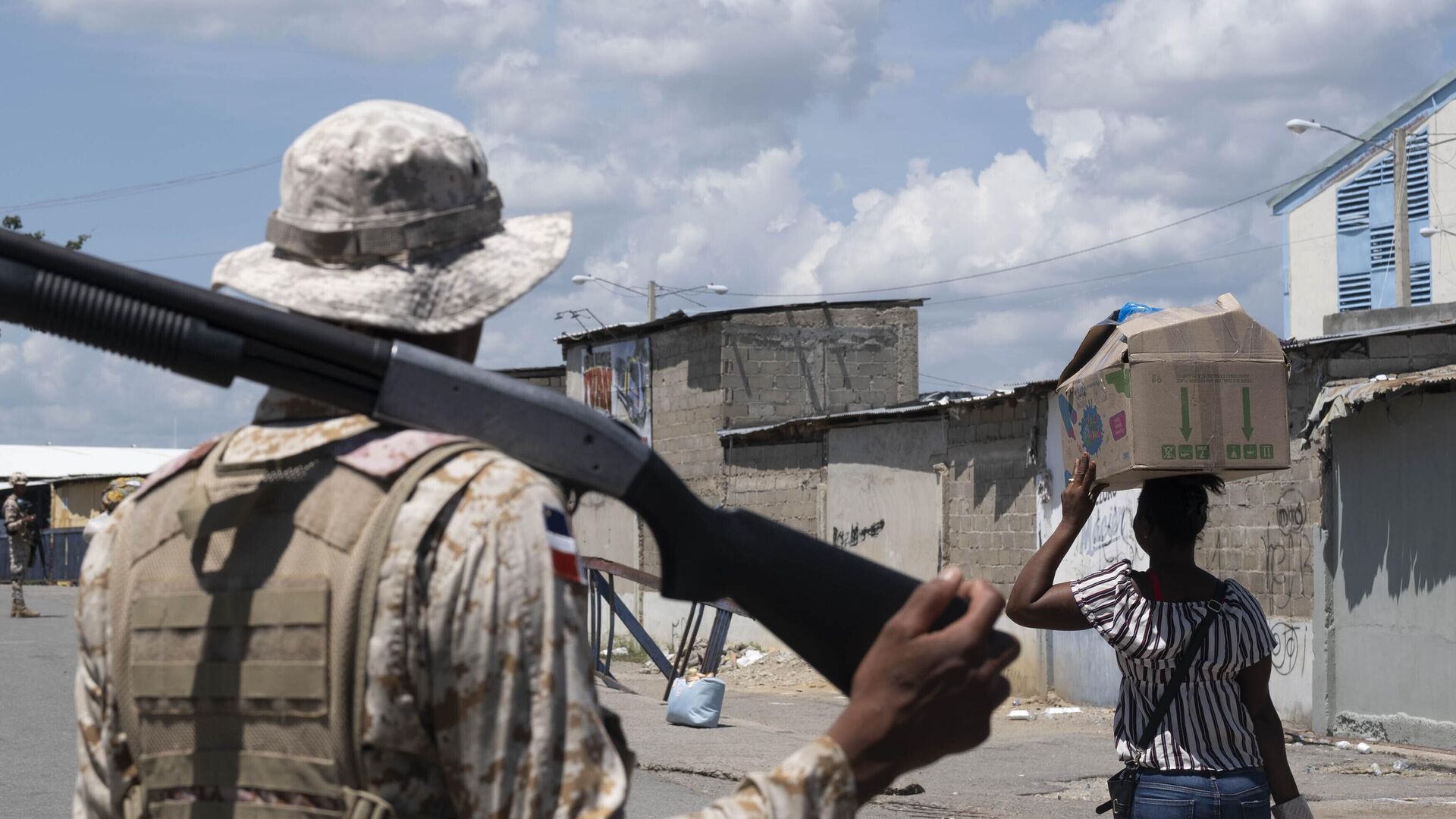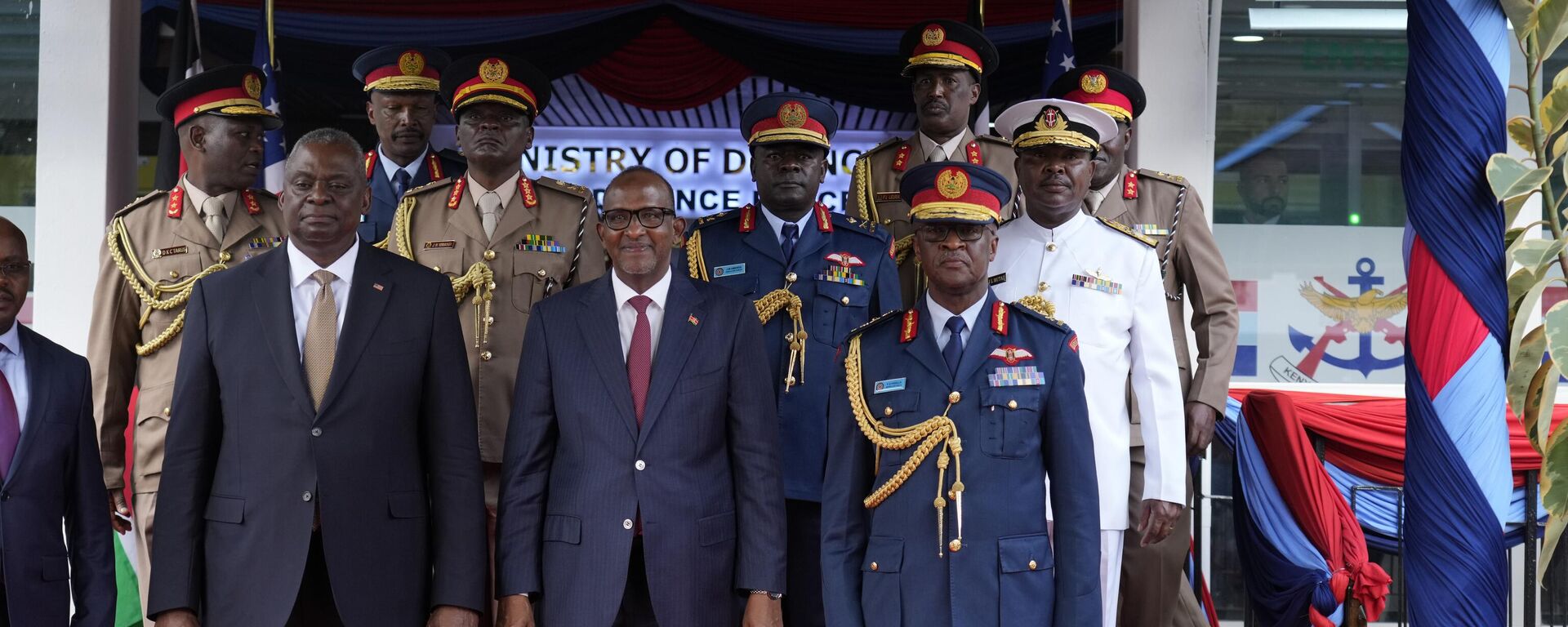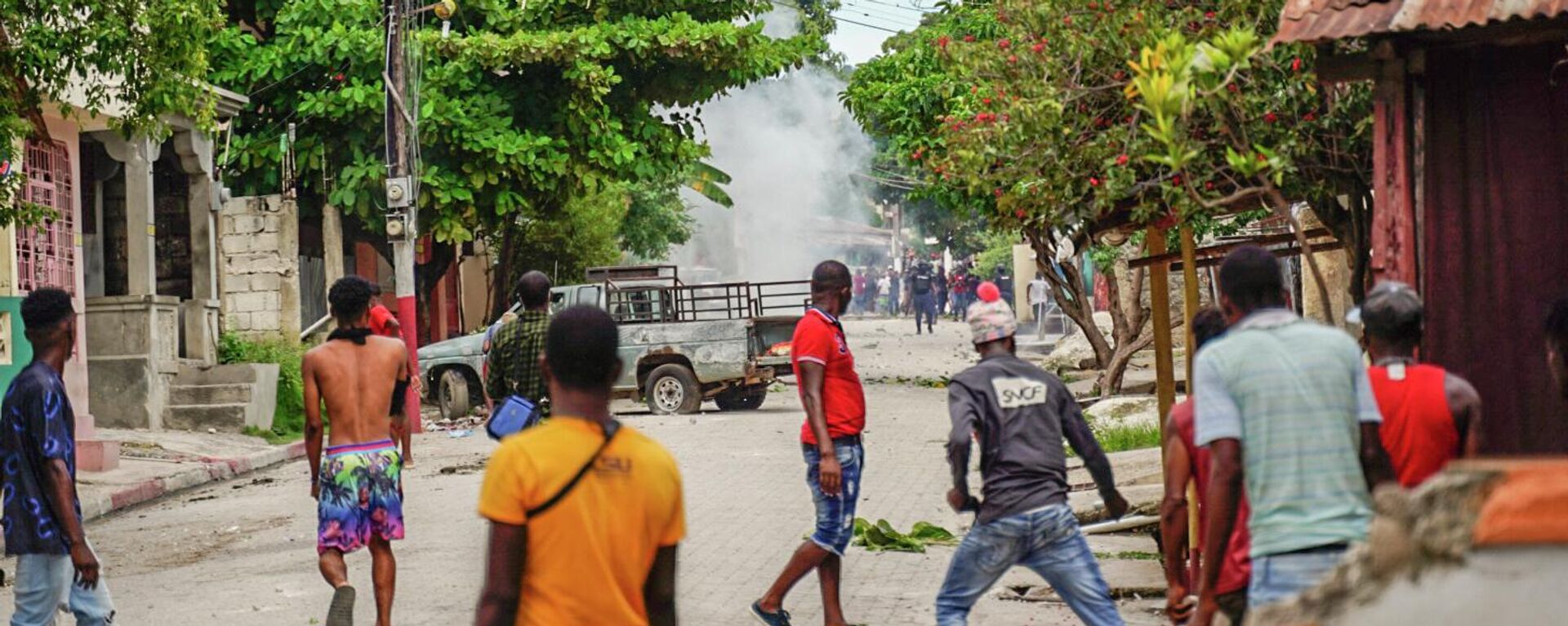https://en.sputniknews.africa/20231003/what-is-kenya-led-haiti-mission--why-did-un-approve-its-deployment-1062505228.html
What Is Kenya-Led Haiti Mission & Why Did UN Approve Its Deployment?
What Is Kenya-Led Haiti Mission & Why Did UN Approve Its Deployment?
Sputnik Africa
On Monday, the United Nations Security Council authorized the deployment of an international security force to assist Haiti's national police in containing the... 03.10.2023, Sputnik Africa
2023-10-03T13:42+0200
2023-10-03T13:42+0200
2023-10-03T13:43+0200
features
haiti
united nations (un)
united nations security council (unsc)
kenya
conflict
police
international
https://cdn1.img.sputniknews.africa/img/07e7/0a/03/1062509498_0:160:3072:1888_1920x0_80_0_0_cc83f0a86b429dafcbd6eacb749fece8.jpg
The Multinational Security Support (MSS) mission was authorized by UN envoys in New York, who adopted the resolution with a recorded vote of 13 in favor and 2 abstentions (Russia and China), to assist in securing critical infrastructure in Haiti. The resolution, adopted under Chapter VII of the UN Charter, which gives the Security Council a mandate to maintain global peace and security, was drafted by the United States and Ecuador. Its adoption paved the way for Kenya and some other contributing countries to send security forces to the nation. On this occasion, Sputnik Africa provides key details about the mission and outlines the reasons behind the UN Security Council's decision to deploy it.What Is MSS? The Multinational Security Support (MSS) is an international security force that receives UN support but is not operated by the organization. The expenses incurred during the operation will be financed by voluntary contributions and assistance from individual states and regional institutions in accordance with the international law.The primary objective of the mission is to provide operational assistance to the Haiti National Police (HNP) in combating criminal groups that abduct people, subject them to sexual and gender-based violence, participate in human trafficking, smuggling of migrants and weapons, as well as commit murders, extrajudicial killings and recruit children into their ranks.Among other things, the non-UN mission aims to secure unimpeded and safe access to humanitarian aid for millions of Haitians in need.Kenya has proposed to assume leadership of the multinational force and has offered to contribute 1,000 police officers. The Bahamas, Jamaica, and Antigua and Barbuda have also made commitments to deploy their personnel.The US, while not contributing any troops, pledged to provide $100 million in logistical support in the form of intelligence, airlift, communications, and medical capabilities. Several other countries, which attended a meeting on the sidelines of the UN General Assembly last month to discuss the proposed multinational force, reportedly announced pledges of support.Situation in HaitiFollowing the assassination of President Jovenel Moise in July 2021, Haiti has entered a multifaceted crisis marked by political gridlock, severe violence, and deteriorating humanitarian conditions. The interim government led by Prime Minister Ariel Henry has been unable to negotiate a political agreement with opposition groups regarding the organization of elections.Politically linked criminal groups have taken control of approximately 80% of the capital city of Port-au-Prince, causing an unprecedented surge of violent crimes. Over 3,000 murders and more than 1,500 cases of kidnapping for ransom have been reported this year alone, according to UN estimates. Around 200,000 people have been internally displaced, while sexual violence and abuse by armed gangs directed towards women and girls continues to rise. Furthermore, tens of thousands of children are unable to attend school.About half of the population is experiencing food insecurity as aid organizations increasingly struggle to access communities. Several neighboring countries have increased their border security, while the Dominican Republic has shut down its border with Haiti.In Pursuit for International HelpIn October 2022, the Haitian government requested the immediate deployment of an "international specialized force" to stabilize the country's security situation and address the multidimensional crisis.Subsequently, Secretary-General Antonio Guterres presented a special report to the Security Council that detailed potential methods to bolster security in Haiti. In the report, he proposed that one or more member states may, in cooperation with the Haitian government, deploy a rapid action force to support the HNP. However, the proposed mission was stalled due to the absence of a country willing to take the lead. Although the US did not want to lead the mission itself, the country still organized bilateral consultations with a number of regional nations.In early July, Guterres once again urged countries to send multinational forces to assist the Haitian police in the fight against criminal groups.On July 29, ten months after Haiti made the initial request, Kenyan Foreign Minister Alfred Mutua announced that his country had agreed to "positively consider" leading a multinational force to Haiti. He specified that Kenya plans to send 1,000 police officers as part of a contingency to "assist in the training of Haitian police, restore normalcy in the country, and protect strategic installations."Several Caribbean nations, including Jamaica, Barbados, and Antigua and Barbuda, also announced their intention to either participate or consider participating in the mission. These pledges have been welcomed by Haiti, the US, and the Caribbean Community (CARICOM).From August 21 to 23, a delegation from Kenya conducted a needs assessment in Haiti and held meetings with Haitian and UN officials and members of the diplomatic community. Following the visit, Ecuador and the US introduced a draft resolution authorizing the multinational security force.
https://en.sputniknews.africa/20231003/unsc-authorizes-kenya-others-to-dispatch-police-forces-to-haiti-for-support-mission-1062503669.html
https://en.sputniknews.africa/20230731/haiti-welcomes-kenyas-offer-to-lead-peacekeeping-force-amid-ongoing-gang-violence-1060944094.html
haiti
kenya
Sputnik Africa
feedback@sputniknews.com
+74956456601
MIA „Rossiya Segodnya“
2023
News
en_EN
Sputnik Africa
feedback@sputniknews.com
+74956456601
MIA „Rossiya Segodnya“
Sputnik Africa
feedback@sputniknews.com
+74956456601
MIA „Rossiya Segodnya“
haiti , united nations (un), united nations security council (unsc), kenya, conflict, police, international
haiti , united nations (un), united nations security council (unsc), kenya, conflict, police, international
What Is Kenya-Led Haiti Mission & Why Did UN Approve Its Deployment?
13:42 03.10.2023 (Updated: 13:43 03.10.2023) On Monday, the United Nations Security Council authorized the deployment of an international security force to assist Haiti's national police in containing the escalating gang violence and reinstating peace across the conflict-ridden Caribbean nation.
The Multinational Security Support (MSS) mission was authorized by UN envoys in New York, who adopted the resolution with a recorded vote of 13 in favor and 2 abstentions (Russia and China), to assist in securing critical infrastructure in Haiti.
The resolution, adopted under Chapter VII of the UN Charter, which gives the Security Council a mandate to maintain global peace and security, was drafted by the United States and Ecuador. Its adoption paved the way for Kenya and some other contributing countries to send security forces to the nation.
On this occasion, Sputnik Africa provides key details about the mission and outlines the reasons behind the UN Security Council's decision to deploy it.
The Multinational Security Support (MSS) is an international security force that receives UN support but is not operated by the organization. The expenses incurred during the operation will be financed by voluntary contributions and assistance from
individual states and regional institutions in accordance with the international law.
The primary objective of the mission is to provide operational assistance to the Haiti National Police (HNP) in combating criminal groups that abduct people, subject them to sexual and gender-based violence, participate in human trafficking, smuggling of migrants and weapons, as well as commit murders, extrajudicial killings and recruit children into their ranks.
Among other things, the non-UN mission aims to secure unimpeded and safe access to humanitarian aid for millions of Haitians in need.
Kenya has proposed to assume leadership of the multinational force and has offered to contribute 1,000 police officers. The Bahamas, Jamaica, and Antigua and Barbuda have also made commitments to deploy their personnel.
The US, while not contributing any troops, pledged to provide $100 million in logistical support in the form of intelligence, airlift, communications, and medical capabilities. Several other countries, which attended a meeting on the sidelines of the UN General Assembly last month to discuss the proposed multinational force, reportedly announced pledges of support.
The mission is authorized for deployment for a year with a review scheduled after nine months. The date for the future deployment, however, remains undetermined.
Following the assassination of President Jovenel Moise in July 2021, Haiti has entered a multifaceted crisis marked by political gridlock, severe violence, and deteriorating humanitarian conditions. The interim government led by Prime Minister Ariel Henry has been unable to negotiate a political agreement with opposition groups regarding the organization of elections.
Politically linked
criminal groups have taken control of approximately 80% of the capital city of Port-au-Prince, causing an unprecedented surge of violent crimes. Over 3,000 murders and more than 1,500 cases of kidnapping for ransom have been reported this year alone, according to UN estimates.
Around 200,000 people have been internally displaced, while sexual violence and abuse by armed gangs directed towards women and girls continues to rise. Furthermore, tens of thousands of children are unable to attend school.
About half of the population is experiencing food insecurity as aid organizations increasingly struggle to access communities. Several neighboring countries have increased their border security, while the Dominican Republic has shut down its border with Haiti.
In Pursuit for International Help
In October 2022, the Haitian government
requested the immediate deployment of an "international specialized force" to stabilize the country's security situation and address the multidimensional crisis.
Subsequently, Secretary-General Antonio Guterres presented a special report to the Security Council that detailed potential methods to bolster security in Haiti. In the report, he proposed that one or more member states may, in cooperation with the Haitian government, deploy a rapid action force to support the HNP.
However, the proposed mission was stalled due to the absence of a country willing to take the lead. Although the US did not want to lead the mission itself, the country still organized bilateral consultations with a number of regional nations.
In early July, Guterres once again urged countries to send multinational forces to assist the Haitian police in the fight against criminal groups.
On July 29, ten months after Haiti made the initial request, Kenyan Foreign Minister Alfred Mutua
announced that his country had agreed to "positively consider" leading a multinational force to Haiti. He specified that Kenya plans to send 1,000 police officers as part of a contingency to "assist in the training of Haitian police, restore normalcy in the country, and protect strategic installations."
Several Caribbean nations, including Jamaica, Barbados, and Antigua and Barbuda, also announced their intention to either participate or consider participating in the mission. These pledges have been welcomed by Haiti, the US, and the Caribbean Community (CARICOM).
From August 21 to 23, a delegation from Kenya conducted a needs assessment in Haiti and held meetings with Haitian and UN officials and members of the diplomatic community. Following the visit, Ecuador and the US introduced a draft resolution authorizing the multinational security force.



